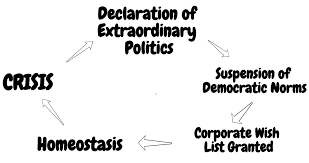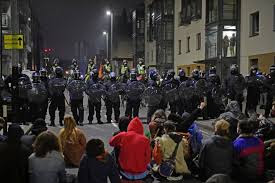My statistical records tell me that I have published 411 blogposts since January 2016 when I first became an online blogger. To be honest, I cannot remember them all which makes trawling through them an interesting adventure. Sometimes, I come across a post, read it - and exclaim to myself, "That still reads well. This is still relevant. This is worth re-circulating". When I re-read the post I published on 31 March last year, that was my reaction. Its title then was: 'WHAT KIND OF SOCIETY DO I WANT AND IS IT THE SAME AS THE SOCIETY WE NEED'. Today, I republish it with tweaks here and there to take account of the Quaker perspective that now shapes me.
The blogpost began with a thank you to my friend, David Siggers, in Brent in London. Sadly, David died earlier this year - see my tribute here. Here is how it developed:
"David recently sent me another gift - this time, a book: 'Alone in Berlin' (1947/2009), written by the German author, Hans Fallada (1893-1947). David wrote: 'the protagonists reminded me of you and other bloggers drip-drip of information against this government'. Thank you, David. Sam Munson in The National wrote that Fallada's work is 'the great novel of German resistance ... (and) deserves a place among the 20th century's best novels of political witness'. Philip Hensher in the Independent describes the book as '(Fallada's) heartbreaking tale of futile resistance in Nazi Berlin'. I am fifty pages in; there are around 600 pages in all. I am hooked. It is gut-wrenching.
(I did - slowly - finish reading Fallada's masterpiece. Emotionally, I could only take twenty minutes or so exposure at any one reading.)
 |
| When a democracy slipped into dictatoship - and fear governed every encounter |
I began my formal resistance to the new government in the UK the day after they were returned to power back in December 2019 - see this link here - but you will have seen if you opened the link that my warnings pre-date that General Election at the end of 2019. From my political and social and spiritual perspective, as a Christian socialist, I find what has happened over this last decade - and particularly in this last last year and a half - deeply troubling.
Who else thinks so? I was inspired to wrote this blogpost today by an article in one of my two daily newspapers: the 'i' (the other one is the 'Morning Star'), written by the columnist, Yasmin Alibhai-Brown, under the title: 'Racism and sexism stalk this land that I no longer recognise'. Here are some
extracts:
'I barely recognise this country, my country. what happened to the inclusive, cohesive, upbeat Britain of the 2012 Olympics? I elatedly waved our flag then. Now that flag represents insistent, authoritarian nationalism and is becoming a shoddy way to separate "true" Brits from those millions who are barely tolerated and always suspect.
'Britain's hostile environment is becoming unendurable for liberals, those committed to ethical governance, environmentalists, minorities, recent migrants and asylum seekers, young idealists, and girls and women subjected to constant sexism.
 |
| Diane Abbott, Labour MP for Hackney North and Stoke Newington, has been subjected to almost unimaginable racist abuse online. |
Yasmin cites the 'bitter bile' of a 'white, male columnist' that is emitted on people of colour - including herself. His name has been removed from the article. Newspaper owners and their editors can permit only so much licence. Naming and shaming is a step too far, it seems.
'For those of us at the receiving end, there is nowhere to hide, no redress. The state itself, seized in what the actress Miriam Margoyles describes as a "right-wing coup", has gone rogue. And our Prime Minister is the shining exemplar of that descent into political perdition ... Democracy is corrupted. (My) grief (is) for bygone political principles and probity, trepidation about resurgent, normalised racism and sexism, and the breakdown of civilised discourse.'
Exactly.
I have a theory that some of you who read me regularly will already have seen taking shape. Naomi Klein in 'The Shock Doctrine: the Rise of Disaster Capitalism' (2007) argues that events such as the Iraq war were undertaken with the intention of pushing through policies that otherwise would have been difficult to achieve. In 2017, Klein wrote that 'I used the term "shock doctrine" to describe the brutal tactic of using the public's disorientation following a collective shock - wars, coups, terrorist attacks, market crashes or natural disasters - to push through radical pro-corporate measures ... this strategy has been a silent partner to the imposition of neoliberalism for more than 40 years.'
 |
| The vicious circle of 'Disaster Capitalism |
I am sure you can anticipate my direction of travel and have grasped the outline of my theory already. The COVID-19 pandemic has been 'facilitated', as they say these days. In New Zealand, herd immunity was dismissed as an 'unthinkable' policy. Here in the UK - and wherever market forces trump respect for human lives - it has become acceptable language. This is how and why the pandemic has established such a brutal and deadly grip on our society. This is how and why we are experiencing policies and measures that were previously unthinkable, enacted under the cover of the pandemic.
- The kind of society I want - and that we need - is one that does not have a Prime Minister making a joke about how "greed and capitalism" had contributed to the success of the vaccination programme in the UK (Wednesday 25 March 2021 - PM addressing a meeting of his back-bench MPs). Johnson deserves ridicule and worse for his warped understanding of this Covid crisis. We have a vaccine because of the success of public-sector investment, the research skills in our universities and the wonderful capacity of an underfunded NHS to rise to a challenge yet again.
- The kind of society I want - and that we need - is one that does not have its government resetting the balance of acceptable policing. I thought Kenan Malik in The Observer (14 March 2021) got it spot-on in his piece under the title: 'If you thought the right to protest was inalienable, think again':
'The pandemic has created a public health emergency requiring constraints on our rights and unprecedented levels of policing. By and large, the authorities have gained the consent of the British public to impose such restrictions. The question now is how far an exceptional year has shifted our sense of what is acceptable and to what we will consent.
 |
| Roman Krznaric - Australian-born British philosopher |
- Deep-time Humility - grasp that we are an eyeblink in cosmic time
- Legacy Mindset - be remembered well by posterity
- Intergenerational Justice - consider the seventh generation ahead
- Cathedral Thinking - plan projects beyond a human lifetime
- Holistic Forecasting - envision multiple pathways for civilisation
- Transcendent Goal - strive for one-planet thriving'
Now there is a prescription for a saner world. And it seems to me only such programmes as this will give our world - a world that has so much magnificence amidst its miseries - a chance of surviving."
From my Quaker perspective, I find a special resonance in Krznaric's first idea: we need deep-time humility. We need to grasp that we are an eyeblink in cosmic time. I have already explained in previous blogposts that in the summer I paused my writing and research for my latest book: 'Mine to Die' in order to write a series of six blogposts that explore my world perspective as a new Quaker attender - you can find links to this series by pressing here. In these posts, I explored the matters that I encountered during the Quaker hour of silence, led, as I believe, by the light of the Spirit that is in all humanity, binding us together.
Most recently, the idea that has begun to attract me is the need to explore our identity as specks in time. Not mere specks - brief lives of no significance - but specks, nevertheless, in the big picture. Why are some specks remembered for the good they contribute to others and the natural world? Why do some specks accumulate a charge-sheet of awful, harm-filled behaviour in their lifetime? Does it matter that most of the actions for good remain unknown, unrecorded? Who decides what is an action for good? What does it mean to do good in this big picture where there are billions of specks alive in the here and now, and billions now dead, who have lived and helped to shape that big picture? What is our responsibility in all this?
These seem to me matters of profound importance, worthy of contemplation in silence for far longer and wider than my own brief life.
Krznaric's other five ideas are of similar value. Here is the substance for discussion that leads to action - and to non-action. Teach us to care - and not to care. Teach us to sit still.

No comments:
Post a Comment